Improving supply chain efficiency with GPT-3 in retail businesses
Discover how GPT-3 can revolutionize the retail industry by improving supply chain efficiency. Read our article to learn how advanced AI technology can optimize inventory management, streamline logist
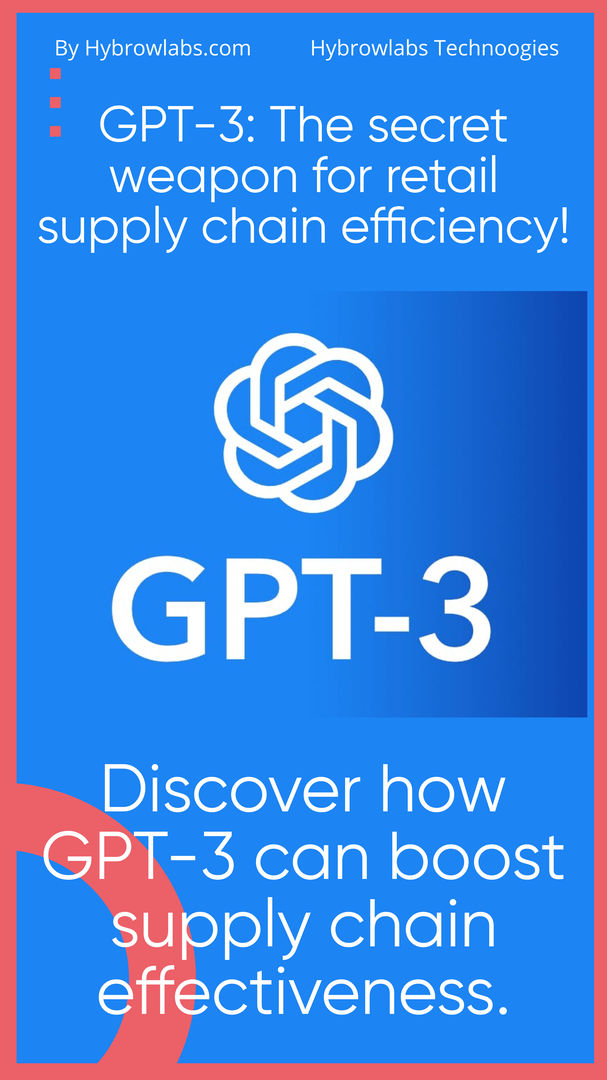
Retail companies in today’s modern world may face severe competition as well as challenging market conditions. The effectiveness of a retail company's supply chain is one of the crucial aspects that can influence its success. Businesses may lower expenses, boost productivity, and enhance customer satisfaction with a well-optimized supply chain. We will talk about how GPT-3 can boost supply chain effectiveness for retailers in this article.
Understanding GPT-3:
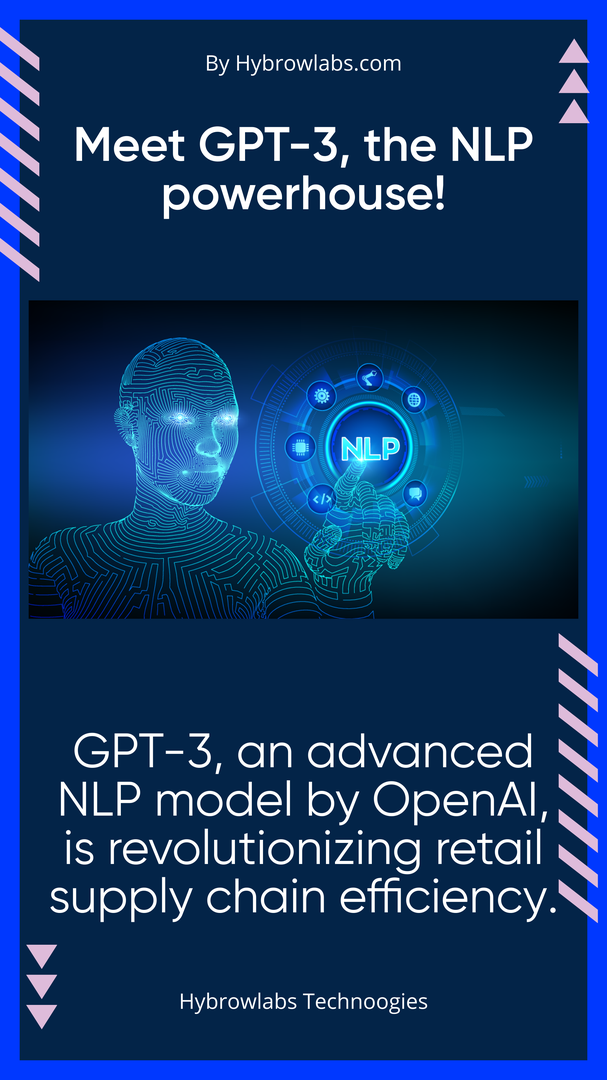
A cutting-edge natural language processing (NLP) model created by OpenAI is called GPT-3. It is one of the most sophisticated and potent NLP models currently on the market, and it has the ability to complete texts, translate across languages, and respond to questions. GPT-3 is a fantastic tool for a variety of applications since it creates human-like writing using machine learning techniques.
The ability to produce high-quality material rapidly, adapt to many subjects and languages, and learn from large volumes of data are just a few of the primary characteristics and advantages of GPT-3. With its advanced capabilities, GPT-3 can be a game-changer for retail businesses looking to improve their supply chain efficiency.
How GPT-3 can supercharge your supply chain efficiency?
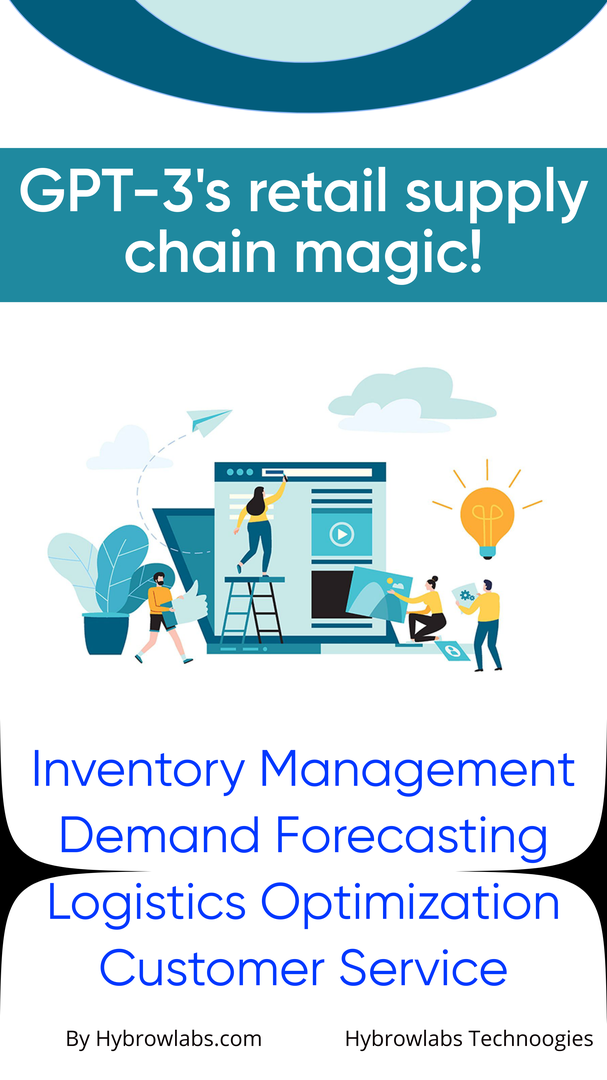
GPT-3 can be used in various ways to improve the supply chain efficiency of retail businesses. Here are some of the most significant applications of GPT-3 in retail supply chain:
1. Inventory Management:
As part of supply chain management, inventory management is essential. Retailers often struggle with inventory management, either having too much or too little stock on hand. GPT-3 can help retailers optimize their inventory by analyzing sales data, lead times, and other factors to ensure they have the right products in the right quantities at the right time.
For example, a retailer can use GPT-3 to determine the optimal amount of a particular product to order, based on past sales data, expected demand, and supplier lead times.
2. Demand Forecasting:
Demand forecasting is a key component of supply chain management since it enables companies to optimize their stock levels and production schedules. GPT-3 can be used to analyze consumer behavior, market trends, and other relevant information to accurately forecast future demand. This can assist companies in improving the effectiveness of their entire supply chain.
For example, a retailer can use GPT-3 to predict the demand for winter coats based on past sales data, weather forecasts, and trending social media posts related to cold weather.
3. Logistics Optimization:
Efficient logistics is critical for a successful supply chain. GPT-3 can help retailers optimize their logistics by analyzing shipping routes, delivery times, and other factors to ensure timely and cost-effective delivery of products.
For example, a retailer can use GPT-3 to determine the most efficient shipping route for a particular product, taking into account factors such as distance, traffic, and fuel costs.
4. Customer Service:
Excellent customer service is essential for retaining and attracting new customers. Customer feedback, issues, and other important information can be analyzed using GPT-3 to spot problems with customer service and provide solutions. This might assist businesses in enhancing customer satisfaction and customer service.
For example, A clothing retailer could use GPT-3 to analyze customer feedback and identify a recurring issue with shipping delays. By quickly addressing this issue and implementing a solution, the retailer can improve its supply chain efficiency and enhance customer satisfaction.
Boost Your Retail Supply Chain to the Next Level with GPT-3: Unleashing the Benefits!
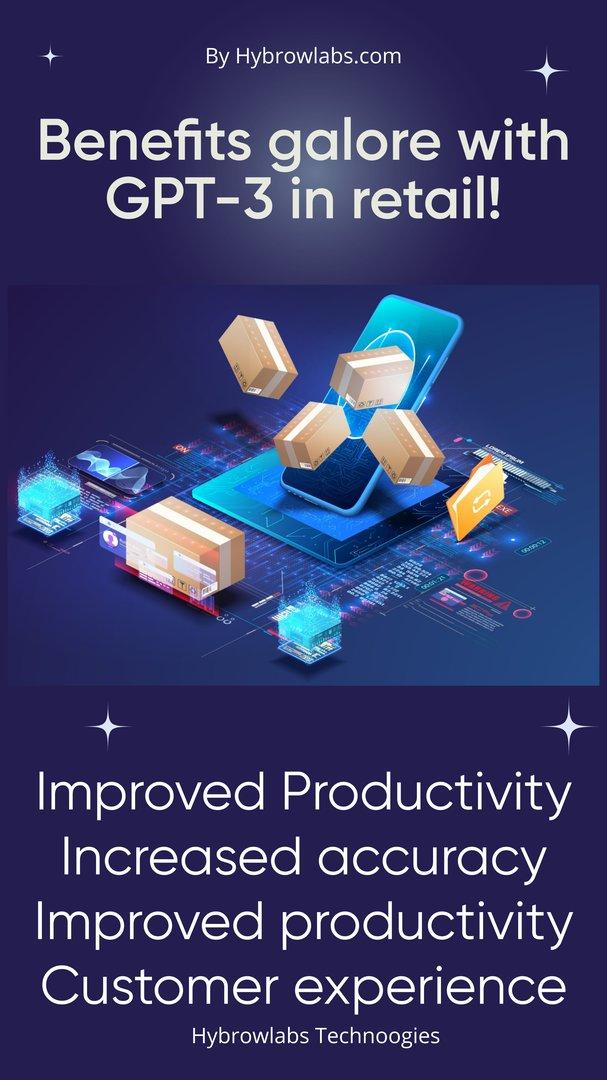
The use of GPT-3 in retail supply chain management can provide several benefits, including:
1. Improved Productivity:
By automating certain tasks and streamlining supply chain operations, GPT-3 can help businesses to improve their productivity and efficiency. This can lead to faster product development cycles, shorter lead times, and improved customer satisfaction.
2. Enhanced Customer Experience:
By optimizing supply chain operations and improving product quality, GPT-3 can help businesses to provide a better customer experience. This can lead to increased customer loyalty and repeat business, which is critical for long-term success in the retail industry.
3. Better product recommendations:
GPT-3 can analyze customer data to provide personalized product recommendations, helping retailers increase sales and customer satisfaction.
4. Streamlined supply chain processes:
GPT-3 can be used to automate manual processes such as order processing, invoicing, and shipping, freeing up employees to focus on more value-added tasks.
5. Accurate product labeling:
GPT-3 can generate accurate and consistent product labeling information, helping retailers comply with regulatory requirements and avoid costly fines.
Better supplier management: GPT-3 can be used to analyze supplier performance data, helping retailers identify and address any issues with their suppliers.
Challenges in Implementing GPT-3 in Retail Supply Chain: A quick look:
Despite its many benefits, implementing GPT-3 in retail supply chain management can be challenging. Some of the main challenges include:
1. Data quality and privacy concerns:
GPT-3 requires high-quality data to function effectively, and retailers may struggle to ensure that their data is accurate and complete. As GPT-3 requires access to large amounts of customer data to function effectively, retailers must ensure that they are following best practices for data privacy and protection.
Example: A retailer may have incomplete or inconsistent product data, leading to errors and inaccuracies in the supply chain process.
2. Limited language support:
GPT-3 currently only supports a few languages, which may pose a challenge for retailers operating in multiple regions with different languages.
Example: A retailer with stores in both Spain and China may have difficulty implementing GPT-3 in their supply chain processes due to the limited language support.
3. Lack of domain-specific knowledge:
While GPT-3 has impressive language processing capabilities, it may not have the necessary domain-specific knowledge required for certain retail supply chain processes.
Example: GPT-3 may struggle to accurately process and analyze data related to specialized products, such as medical equipment or industrial machinery.
4. Difficulty in understanding context:
GPT-3 may have difficulty understanding the context of certain retail supply chain processes, leading to inaccuracies or errors.
Example: GPT-3 may misinterpret a customer's product request, leading to the wrong item being shipped and causing delays and dissatisfaction.
While these challenges can be daunting, they can be overcome with careful planning, proper training, and ongoing support. By addressing these challenges, retailers can reap the benefits of GPT-3 in their supply chain processes and gain a competitive edge in the retail industry.
GPT-3 Implementation in Retail: Best Practices for Supply Chain Success!
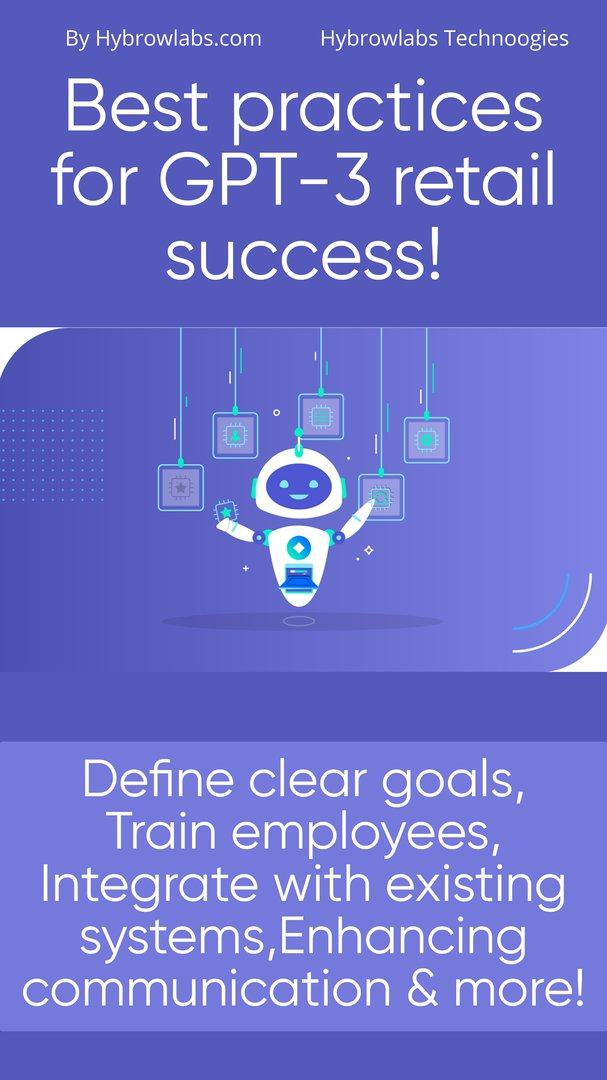
To overcome these challenges and effectively implement GPT-3 in retail supply chain management, businesses should follow some best practices, including:
1. Define Clear Goals:
Retailers should establish specific goals and objectives prior to using GPT-3, such as increasing the accuracy of demand forecasts or decreasing transportation expenses. By doing so, it will be possible to measure the likely benefits and ensure that the implementation is in line with the overall business strategy.
Example: A retailer may implement GPT-3 to improve the accuracy and efficiency of their order processing, with the goal of reducing errors and delays.
2. Continuous Monitoring and Improvement:
With more data and feedback, GPT-3 is a learning technology that can get better over time. Retailers should continuously monitor and evaluate the performance of GPT-3 to identify any issues or areas for improvement.
Example: A retailer may track the accuracy and efficiency of their order processing after implementing GPT-3 to determine the technology's impact on their supply chain processes.
3. Employee Training:
Employees involved in using GPT-3 should receive adequate training and support to effectively use the technology in their day-to-day work. This contains instruction on how to use GPT-3, how to interpret its results, and recommended practices for data protection and security.
Example: A retailer may provide training sessions and workshops to help employees understand how to use GPT-3 for order processing and other supply chain tasks.
4. Integrate with Existing Systems:
GPT-3 should be seamlessly integrated with existing supply chain systems, including inventory, logistics, and customer relationship management (CRM) applications to ensure smooth operation and minimize disruption. By doing this, GPT-3 will be able to fully utilize the advantages that come from existing data sources.
Example: A retailer may integrate GPT-3 with their order management system to automate the processing of orders and reduce the workload on employees.
5. Personalizing customer experience:
GPT-3 can also be used to personalize the customer experience by creating custom product recommendations and personalized marketing messages. By analyzing customer data and behavior, GPT-3 can generate personalized recommendations that are tailored to each individual customer. This not only improves the customer experience but also increases the chances of making a sale.
For example, a retail website can use GPT-3 to analyze customer data and suggest products that the customer is more likely to be interested in, which can lead to higher customer satisfaction and increased sales.
6. Improving supply chain transparency:
Supply chain transparency is becoming increasingly important for consumers who want to know where their products come from and how they were made. GPT-3 can be used to improve supply chain transparency by providing real-time updates on inventory levels, shipping times, and delivery status.
For example, a retailer can use GPT-3 to track inventory levels and provide accurate delivery estimates to customers, which can help reduce the risk of stockouts and improve customer satisfaction.
7. Enhancing communication with suppliers:
Effective communication with suppliers is essential for any retail business. GPT-3 can help businesses communicate more effectively with suppliers by analyzing large amounts of data and providing real-time updates on inventory levels, shipment status, and delivery times. By automating routine communication tasks, GPT-3 can free up employees to focus on more strategic tasks.
For example, a retailer can use GPT-3 to place orders with suppliers and track delivery status, which can save time and reduce the risk of errors.
8. Address ethical concerns:
Retailers should address ethical concerns related to the use of AI in their supply chain processes, such as ensuring fairness and avoiding bias.
Example: A retailer may implement measures to ensure that their AI-powered tools, including GPT-3, are not inadvertently discriminating against certain groups of customers.
By following these best practices, retailers can effectively implement GPT-3 in their supply chain processes and realize the benefits of improved efficiency, accuracy, and customer satisfaction.
Conclusion:
GPT-3 can offer a variety of advantages to the retail supply chain management process, including cost savings, higher accuracy, increased productivity, and improved customer satisfaction. Its implementation can be difficult anyway because it calls for a high level of technical knowledge, organizational changes, and ethical considerations. Businesses can successfully use GPT-3 and realize its potential benefits in the retail supply chain by adhering to best practices and working with specialists like those at Hybrowlabs Development Services.
FAQs:
1. Are there any ethical concerns around using GPT-3 in supply chain management?
Yes, there are potential ethical concerns around data privacy and security. Businesses must ensure that they are using GPT-3 responsibly and protecting customer data.
2. Can GPT-3 improve customer satisfaction in retail businesses?
Yes, by improving product quality and streamlining logistics operations, GPT-3 can help businesses to enhance the customer experience and increase customer satisfaction.
3. What are the benefits of collaborating with AI and supply chain management experts when implementing GPT-3?
Partnering with experts can help businesses to avoid common mistakes, learn from others' experiences, and optimize the effectiveness of GPT-3 in the supply chain management process.
No comments yet. Login to start a new discussion Start a new discussion